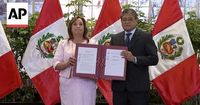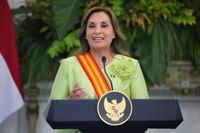On Wednesday, August 13, 2025, Peru’s president signed a controversial amnesty bill into law, shielding military personnel and police officers from prosecution for alleged human rights abuses committed during the country’s bloody internal conflict with the Shining Path insurgency. The move, which comes after decades of legal wrangling and public debate, has ignited fierce reactions both inside and outside Peru, pitting calls for national reconciliation against demands for justice from victims and human rights advocates.
The new law, enacted by President Dina Boluarte during an official ceremony in Lima, covers crimes allegedly committed between 1980 and 2000—a period marked by one of Latin America’s most violent insurgencies. The war between the Peruvian military and the Shining Path, a Maoist guerrilla group, left an estimated 70,000 people dead, according to a truth commission cited by both the Los Angeles Times and the Associated Press. The vast majority of those killed were rural Peruvians, many of them Indigenous, caught in the crossfire between government forces and insurgents.
“Peru honors those people who confronted the insurgency with courage and dedication,” President Boluarte declared at the signing ceremony, as reported by AP. She acknowledged the toll the ongoing legal battles have taken on the armed forces and their families, adding, “Military members and police officers have carried for years the burden of endless trials, unjust accusations, and a pain that has affected not only them but also their families.” Her remarks underscored the government’s view that the time had come to close a painful chapter and recognize the sacrifices of those who fought the insurgency.
But the law’s passage has been anything but unifying. Almost immediately, it drew a sharp rebuke from local and international human rights organizations. Human Rights Watch, in a statement quoted by both AP and the Los Angeles Times, condemned the law for “granting impunity” to those involved in serious crimes, warning that Peru now “joins Nicaragua, Venezuela and other countries” in “disregarding the rights of victims.” Juanita Goebertus, Americas director at Human Rights Watch, was especially blunt: “This law is quite simply a betrayal of Peruvian victims. It undermines decades of efforts to ensure accountability for atrocities and weakens the country’s rule of law even further.”
According to a coalition of human rights organizations, the law could effectively wipe out 156 existing convictions and another 600 ongoing cases related to abuses during the conflict. Many of these cases involve allegations of massacres, torture, and forced disappearances—crimes that have haunted Peru’s collective memory for generations. The Inter-American Court of Human Rights has previously declared similar amnesty laws in Peru invalid, ruling that they violate the right to justice and breach international human rights standards.
Supporters of the bill, however, see things differently. The measure was passed by Congress in July 2025, with backing from right-wing political parties that have long defended the military’s role in defeating the Shining Path. Chief among these is the Popular Force party, led by Keiko Fujimori. She is the daughter of former President Alberto Fujimori, who died in September 2024 after spending most of the last 15 years of his life in prison for crimes against humanity.
Alberto Fujimori’s legacy continues to cast a long shadow over Peruvian politics. As president from 1990 to 2000, he is credited with stabilizing the economy after years of hyperinflation and, crucially, with crushing the Shining Path insurgency. But his administration also took a dark turn in 1992, when Fujimori ordered the military to dissolve Congress and the Supreme Court, declaring a state of emergency that paved the way for widespread abuses by security forces. While many Peruvians remember him as the leader who restored order and prosperity, others recall the authoritarian excesses and the suffering of countless innocents.
This isn’t the first time Peru has grappled with the question of amnesty for wartime abuses. In 1995, laws were enacted to shield military and police personnel from prosecution for alleged crimes committed during the internal conflict. Those measures, too, were eventually struck down by international courts. The latest law, however, arrives at a time when political polarization in Peru is at a fever pitch, and the wounds of the past remain far from healed.
The truth commission that investigated the conflict concluded that most of its victims were Indigenous Peruvians living in rural areas—people who often had little connection to either side but found themselves trapped by violence. Their stories, documented in harrowing detail, have fueled ongoing demands for accountability and reparations. For many survivors and their families, the new amnesty law feels like a final, crushing blow.
“It undermines decades of efforts to ensure accountability for atrocities,” said Goebertus of Human Rights Watch, echoing the frustration of many in the human rights community. The organization’s statement, as reported by the Los Angeles Times, warned that the law “weakens the country’s rule of law even further.” Critics argue that by closing the door on prosecutions, Peru risks repeating the mistakes of other countries that have chosen impunity over justice.
At the same time, supporters argue that the constant threat of prosecution has placed an unfair burden on those who served during the conflict, many of whom acted under orders in an environment of chaos and fear. They point to the years of “endless trials, unjust accusations, and a pain that has affected not only them but also their families,” as President Boluarte put it. For this camp, the law represents a necessary step toward national reconciliation and healing.
The divide over the amnesty law reflects deeper tensions within Peruvian society. On one side are those who prioritize stability and see the military as heroes who saved the nation from collapse. On the other are those who demand justice for the thousands of civilians—many of them Indigenous—who suffered at the hands of both the insurgents and the state. The fact that the law could nullify hundreds of convictions and ongoing cases only adds to the sense of urgency and outrage among its opponents.
International observers will be watching closely to see how the law is implemented and whether it withstands further legal challenges. The Inter-American Court of Human Rights has already declared similar laws invalid in the past, and it remains to be seen whether this latest effort will stand. For now, though, the law is in force, and Peru finds itself at a crossroads, once again wrestling with the legacy of its violent past.
As Peru moves forward, the debate over justice, accountability, and reconciliation is far from over. The amnesty law may close one chapter, but for many, the wounds of the conflict remain painfully open, a stark reminder that the search for truth and justice is never simple—or complete.






